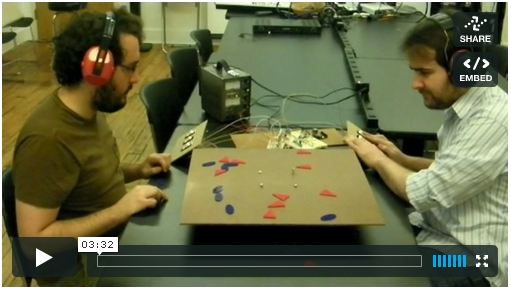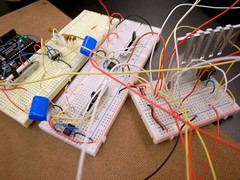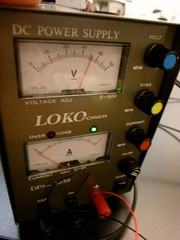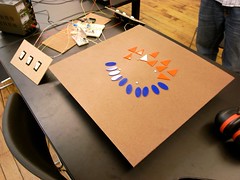Subwoofer Tactics
By C. Anderson Miller on August 2008, Day 3
Adam Parrish and I designed and built a game in which players use a subwoofer and 3 tones to manipulate pieces on a game board.

555 Prototyping:
We played around a lot with materials, and sounds, and we came to the conclusion that 3 tones vibrated masonite at a ferocity we found interesting.
40hz, 80hz and 120hz. So we had to build out 3 circuits.

The big metal guy is a TIP120 Transistor to control this power supply, which then feeds into the subwoofer.

The board game (with acrylic laser cut pieces):

The switches each control one tone. Each player has control over a 40hz tone, an 80hz tone, and a 120hz.
The rules are as follows:
Subwoofer Tactics
A Very Loud Game for 2 Players
by C. Anderson Miller and Adam Parrish
GAME PIECES
(1) Subwoofer Tactics game board. Any reasonably large piece of wood (plastic? metal?) will do. We used a 20″x20″x1/4″ masonite board.
(2) A subwoofer. The subwoofer should be loosely coupled to the board in some way, ideally with the rim of the cone in position to make physical contact with the board. We used a 5.2-inch 30 watt subwoofer from Electronics Goldmine:
https://www.goldmine-elec-products.com/prodinfo.asp?number=G16401
(3) Three oscillators, connected to the subwoofer by means of two sets of three switches (so both players can control the oscillators in turn). The oscillators are tuned to different frequencies, each of which (ideally) causes the board to vibrate in a distinct way. We used three 555 timers at 40Hz, 80Hz, and 120Hz.
(4) A massive power supply for the subwoofer. Get it as loud as possible.
(5) Twenty game pieces, ten for each player.
RULES
The object of Subwoofer Tactics is to knock all of your opponent’s pieces off of the game board.
Setup: Before the match begins, players may place their pieces anywhere on the board, except for the area directly over the subwoofer.
Gameplay: Each player takes turns operating the oscillators for up to five seconds. Any number of oscillators may be turned on or off during the turn, but all oscillators must be inactive at the end of five seconds.
Self-destruct conditions: If any part of the board comes loose and falls off of the board during a player’s turn, that player takes an extra turn. If the board becomes completely inoperable during a player’s turn, that player automatically loses the match.
July 31st, 2008



Leave a Comment
Trackback this post | Subscribe to the comments via RSS Feed